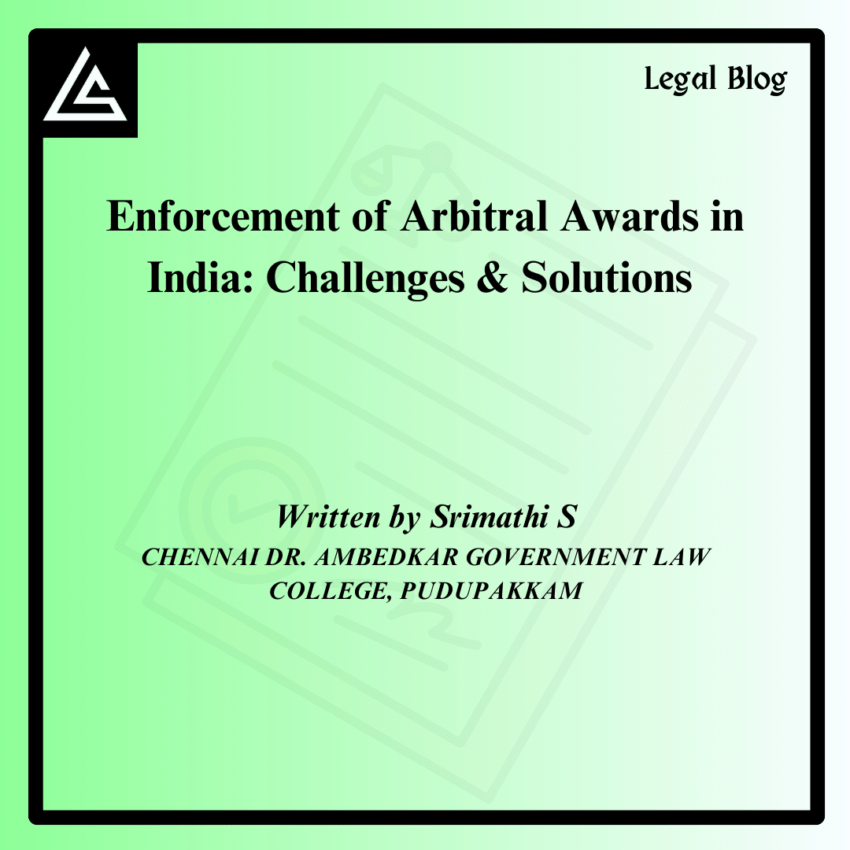Table of Contents
INTRODUCTION:
Generally, an award given by the arbitral tribunal after hearing both the parties of arbitration is known as an arbitral award. In other words, it refers to the adjudication of the arbitral tribunal. Section 31 of the Arbitration and Conciliation Act, 1966 (hereinafter referred as “the Act”) provides the framework of the form and contents of the arbitral award[1]. Under the purview of the section, the essentials of the arbitral award are as follows: a) must be in writing, b) signed by the members of the arbitral tribunal, c) must contain the date and the place of arbitration, shall be in accordance with section 30 the Act (settlement of arbitration), d) state the reason upon which it is based.
The arbitral award can be domestic or International / Foreign. Part 1 of the Act deals with the enforcement of domestic arbitral awards (defined in Section 2(7) wherein both are Indian Parties), whereas part II of the Act deals with the enforcement of foreign awards (defined in Section 44, where in the parties may be from outside India).
PROCEDURE FOR ENFORCEMENT OF ARBITRAL AWARDS
I. DOMESTIC AWARDS: Section 36 of the Act schemes out the provision of enforceability of domestic awards i.e., India – seated arbitrations. The arbitral award shall be enforced after the expiry of the time for making an application for setting aside the award under Section 34 (three months). After the completion of the time, the arbitral award is enforced in the same manner as decree of the court is enforced under the provisions of the Code of Civil Procedure, 1908. In addition, the award shall not become unenforceable when application to set aside the award is made under Section 34, unless the court grants the order of stay.
II. FOREIGN AWARDS: The ultimate requisite for enforcing a foreign award is that the parties which receives an award must be a signatory to New York Convention as well as Geneva Convention. This is because India is a signatory to these conventions, and such awards are recognised and enforced in Indian territory. Section 48 and 49 of the Act outlines the conditions for the recognition and enforcement ot foreign awards. A two-stage process is employed for the enforcement of foreign awards in India. The initial process is to file an execution petition. If the award qualifies the criteria under the Act, then the award is enforced as it is a decree of the court. In this stage, the award can be subjected to various challenges and objections by the opposite party.
The essentials for enforcing the foreign awards are as follows, the presentation of a) either original award or a properly authenticated copy, b) the original agreement or a certified copy of the same, c) other evidence necessary for the enforcement of such award[2].
GROUNDS FOR SETTING ASIDE THE ENFORCEMENT OF DOMESTIC AND FOREIGN AWARDS:
- DOMESTIC AWARDS: An arbitral award can be set aside for enforcement if the party make application establishing a) a party is under incapacity, b) arbitration agreement is not valid, c) proper notice was not given on appointment of arbitral tribunal, d) arbitral award does not address dispute contemplated and such award is beyond the scope of arbitral tribunal[3].
- FOREIGN AWARDS: The grounds for setting aside the enforcement of arbitral awards is the same as domestic awards prescribed under Section 34 of the Act. Additionally, the grounds in foreign awards include that the award is not binding on the parties. The enforcement of arbitral awards can be refused by courts a) when the subject matter of dispute is not capable of settlement under Indian law of arbitration, b) such enforcement is contrary to public policy[4].
LIMITATION FOR ENFORCEMENT OF ARBITRAL AWARDS:
The Hon’ble Supreme court in the case Umesh Goel v. H.P.Coop. Group Housing Society Ltd[5]., ruled that arbitral awards can be treated as decrees of the court. The limitation period for enforcing domestic arbitral award as executing decree is 12 years. The limitation period for enforcement of foreign award is 3 years under Entry 137 of the schedule of the limitation Act, 1963[6].
WHETHER STAMPING AND REGISTRATION ARE REQUIRED FOR ENFORCEMENT OF ARBITRAL AWARDS:
A debatable matter regarding the enforcement of arbitration award is whether registration and stamping of such arbitral award is mandatory. Section 35 of Stamp Act, 1899 stipulates that any award which lacks proper stamping cannot be treated as evidence[7]. This is the place where the necessity of stamping and registration begin. Moreover, Section 17 of the Registration Act, 1908 mandates the registration of arbitral awards in case of immovable property, and the absence of the same can invalidate the arbitral award[8]. In case of foreign awards, the registration and stamping are not necessitated, Because, these awards can be enforced as decrees once the court finds it enforceable[9]. Another thing to be remembered is that non registration or stamping is not a ground for petition under Section 34 of the Act.
CONCLUSION:
The major challenge in enforcing the arbitral awards in India is the necessity of stamping and registration. Though, the statutory provisions mandates the stamping of the arbitral awards and renders its admissibility as evidence, the contention is that non- stamping or inadequate stamping is a curable defect and can be easily rectified rather than rendering void or unenforceable. In this circumstance, the court is vested with the obligation to recover stamp duty penalty under Section 35 of the Indian Stamp Act[10]. The other challenge is the complexity of the process in enforcing domestic awards, which is doubled in case of foreign awards. An important aspect to be considered is the pendency of execution petition in the lower courts and there is no time frame for getting the award executed and enforced. The Act must provide a speedy time frame for the dispute getting resolved. However, the court interference is also restricted not going beyond the foundational principles of arbitration.
[1] Arbitration and Conciliation Act, 1966 § 31, No. 26, Acts of Parliament, 1966 (India)
[2] Id., § 47
[3] Id., § 34
[4] Id., § 48
[5] Umesh Goel v. H.P.Coop. Group Housing Society Ltd., (2016) 11 SCC 313
[6]Vasant Rajasekaran, Harshvardhan Korada, Enforcement of Arbitral Awards in India: An analysis of Potential issues and strategies for success, SCC Times ( July 1, 2024, 04.22 PM), https://www.scconline.com/blog/post/2024/04/02/enforcement-of-arbitral-awards-india-analysis-potential-issues-strategies-for-success/
[7] The Indian Stamp Act, 1899 § 35, No. 2, Acts of Parliament, 1899 (India)
[8]Registration Act, 1908 § 17, No. 16, Acts of Parliament, 1908 (India)
[9] Shriram EPC Ltd. v. Rioglass Solar Sa, (2018) 18 SCC 313 D
[10] Supra 7, At 35
Author :- Srimathi s
Chennai Dr. Ambedkar Government Law College, Pudupakkam
share this post on

